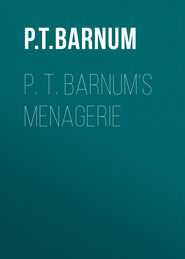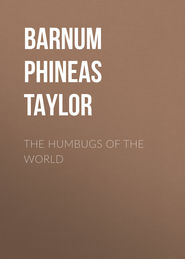По всем вопросам обращайтесь на: info@litportal.ru
(©) 2003-2024.
✖
Struggles amd Triumphs: or, Forty Years' Recollections of P.T. Barnum
Настройки чтения
Размер шрифта
Высота строк
Поля
The General called on me Monday, however, bringing a very nice letter which he had written to Lavinia’s mother. He had concluded to send this letter by his trusty friend, Mr. George A. Wells, instead of going himself, and he had just seen Mr. Wells, who had consented to go to Middleborough with the letter the following day, and to urge the General’s suit, if it should be necessary.
The General went to New York on Wednesday, and was there to await Mr. Wells’ arrival. On Wednesday morning the General and Lavinia walked into my office, and after closing the door, the little General said:
“Mr. Barnum, I want somebody to tell the Commodore that Lavinia and I are engaged, for I am afraid there will be a ‘row’ when he hears of it.”
“Do it yourself, General,” I replied.
“Oh,” said the General, almost shuddering, “I would not dare to do it, he might knock me down.”
“I will do it,” said Lavinia; and it was at once arranged that I should call the Commodore and Lavinia into my office, and either she or myself would tell him. The General, of course, “vamosed.”
When the Commodore joined us and the door was closed, I said:
“Commodore, do you know what this little witch has been doing?”
“No, I don’t,” he answered.
“Well, she has been cutting up one of the greatest pranks you ever heard of,” I replied. “She almost deserves to be shut up, for daring to do it. Can’t you guess what she has done?”
He mused a moment, and then looking at me, said in a low voice, and with a serious looking face, “Engaged?”
“Yes,” said I, “absolutely engaged to be married to General Tom Thumb. Did you ever hear of such a thing?”
“Is that so, Lavinia?” asked the Commodore, looking her earnestly in the face.
“That is so,” said Lavinia; “and Mr. Wells has gone to obtain my mother’s consent.”
The Commodore turned pale, and choked a little, as if he was trying to swallow something. Then, turning on his heel, he said, in a broken voice:
“I hope you may be happy.”
As he passed out of the door, a tear rolled down his cheek.
“That is pretty hard,” I said to Lavinia.
“I am very sorry,” she replied, “but I could not help it. That diamond and emerald ring which you bade me present in my name, has caused all this trouble.”
Half an hour after this incident, the Commodore came to my office, and said:
“Mr. Barnum, do you think it would be right for Miss Warren to marry Charley Stratton if her mother should object?”
I saw that the little fellow had still a slight hope to hang on, and I said:
“No, indeed, it would not be right.”
“Well, she says she shall marry him any way; that she gives her mother the chance to consent, but if she objects, she will have her own way and marry him,” said the Commodore.
“On the contrary,” I replied, “I will not permit it. She is engaged to go to Europe for me, and I will not release her, if her mother does not fully consent to her marrying Tom Thumb.”
The Commodore’s eyes glistened with pleasure, as he replied:
“Between you and me, Mr. Barnum, I don’t believe she will give her consent.”
But the next day dissipated his hopes. Mr. Wells returned, saying that Lavinia’s mother at first objected, for she feared it was a contrivance to get them married for the promotion of some pecuniary advantage; but, upon reading the letter from the General, and one still more urgent from Lavinia, and also upon hearing from Mr. Wells that, in case of their marriage, I should cancel all claims I had upon Lavinia’s services, she consented.
After the Commodore had heard the news, I said to him:
“Never mind, Commodore, Minnie Warren is a better match for you; she is a charming little creature, and two years younger than you, while Lavinia is several years your senior.”
“I thank you, sir,” replied the Commodore, pompously, “I would not marry the best woman living; I don’t believe in women, any way.”
I then suggested that he should stand with little Minnie, as groom and bridesmaid, at the approaching wedding.
“No, sir!” replied the Commodore, emphatically; “I won’t do it!”
That idea was therefore abandoned. A few weeks subsequently, when time had reconciled the Commodore, he told me that Tom Thumb had asked him to stand as groom with Minnie, at the wedding, and he was going to do so.
“When I asked you, a few weeks ago, you refused,” I said.
“It was not your business to ask me,” replied the Commodore, pompously. “When the proper person invited me I accepted.”
Of course the approaching wedding was announced. It created an immense excitement. Lavinia’s levees at the Museum were crowded to suffocation, and her photographic pictures were in great demand. For several weeks she sold more than three hundred dollars’ worth of her cartes de visite each day. And the daily receipts at the Museum were frequently over three thousand dollars. I engaged the General to exhibit, and to assist her in the sale of pictures, to which his own photograph, of course, was added. I could afford to give them a fine wedding, and I did so.
The little couple made a personal application to Bishop Potter to perform the nuptial ceremony, and obtained his consent; but the matter became public, and outside pressure from some of the most squeamish of his clergy was brought to bear upon the bishop, and he rescinded his engagement.
This fact of itself, as well as the opposition that caused it, only added to the notoriety of the approaching wedding, and increased the crowds at the Museum. The financial result to me was a piece of good fortune, which I was, of course, quite willing to accept, though in this instance the “advertisement,” so far as the fact of the betrothal of the parties with its preliminaries were concerned, was not of my seeking, as the recital now given shows. But seeing the turn it was taking in crowding the Museum, and pouring money into the treasury, I did not hesitate to seek continued advantage from the notoriety of the prospective marriage. Accordingly, I offered the General and Lavinia fifteen thousand dollars if they would postpone the wedding for a month, and continue their exhibitions at the Museum.
“Not for fifty thousand dollars,” said the General, excitedly.
“Good for you, Charley,” said Lavinia, “only you ought to have said not for a hundred thousand, for I would not!”
They both laughed heartily at what they considered my discomfiture, and such, looked at from a business point of view, it certainly was. The wedding day approached and the public excitement grew. For several days, I might say weeks, the approaching marriage of Tom Thumb was the New York “sensation.” For proof of this I did not need what, however, was
ample, the newspaper paragraphs. A surer index was in the crowds that passed into the Museum, and the dollars that found their way into the ticket office.
It was suggested to me that a small fortune in itself could be easily made out of the excitement. “Let the ceremony take place in the Academy of Music, charge a big price for admission, and the citizens will come in crowds.” I have no manner of doubt that in this way twenty-five thousand dollars could easily have been obtained. But I had no such thought. I had promised to give the couple a genteel and graceful wedding, and I kept my word.
The day arrived, Tuesday, February 10, 1863. The ceremony was to take place in Grace Church, New York. The Rev. Junius Willey, Rector of St. John’s Church in Bridgeport, assisted by the late Rev. Dr. Taylor, of Grace Church, was to officiate. The organ was played by Morgan. I know not what better I could have done, had the wedding of a prince been in contemplation. The church was comfortably filled by a highly select audience of ladies and gentlemen, none being admitted except those having cards of invitation. Among them were governors of several of the States, to whom I had sent cards, and such of those as could not be present in person were represented by friends, to whom they had given their cards. Members of Congress were present, also generals of the army, and many other prominent public men. Numerous applications were made from wealthy and distinguished persons for tickets to witness the ceremony, and as high as sixty dollars was offered for a single admission. But not a ticket was sold; and Tom Thumb and Lavinia Warren were pronounced “man and wife” before witnesses.
The following entirely authentic correspondence, the only suppression being the name of the person who wrote to Dr. Taylor and to whom Dr. Taylor’s reply is addressed, shows how a certain would-be “witness” was not a witness of the famous wedding. In other particulars, the correspondence speaks for itself.
To the Rev. Dr. Taylor. —Sir: The object of my unwillingly addressing you this note is to inquire what right you had to exclude myself and other owners of pews in Grace Church from entering it yesterday, enforced, too, by a cordon of police for that purpose. If my pew is not my property, I wish to know it; and if it is, I deny your right to prevent me from occupying it whenever the church is open, even at a marriage of mountebanks, which I would not take the trouble to cross the street to witness.
Respectfully, your obedient servant,
W*** S***
804 Broadway, New York, Feb. 16, 1863.








